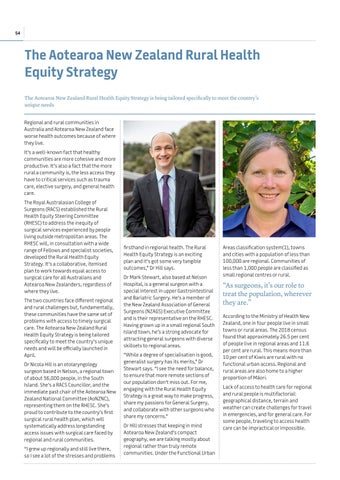54
The Aotearoa New Zealand Rural Health Equity Strategy The Aotearoa New Zealand Rural Health Equity Strategy is being tailored specifically to meet the country’s unique needs Regional and rural communities in Australia and Aotearoa New Zealand face worse health outcomes because of where they live. It’s a well-known fact that healthy communities are more cohesive and more productive. It’s also a fact that the more rural a community is, the less access they have to critical services such as trauma care, elective surgery, and general health care. The Royal Australasian College of Surgeons (RACS) established the Rural Health Equity Steering Committee (RHESC) to address the inequity of surgical services experienced by people living outside metropolitan areas. The RHESC will, in consultation with a wide range of Fellows and specialist societies, developed the Rural Health Equity Strategy. It’s a collaborative, itemised plan to work towards equal access to surgical care for all Australians and Aotearoa New Zealanders, regardless of where they live. The two countries face different regional and rural challenges but, fundamentally, these communities have the same set of problems with access to timely surgical care. The Aotearoa New Zealand Rural Health Equity Strategy is being tailored specifically to meet the country’s unique needs and will be officially launched in April. Dr Nicola Hill is an otolaryngology surgeon based in Nelson, a regional town of about 56,000 people, in the South Island. She’s a RACS Councillor, and the immediate past chair of the Aotearoa New Zealand National Committee (AoNZNC), representing them on the RHESC. She’s proud to contribute to the country’s first surgical rural health plan, which will systematically address longstanding access issues with surgical care faced by regional and rural communities. “I grew up regionally and still live there, so I see a lot of the stresses and problems
firsthand in regional health. The Rural Health Equity Strategy is an exciting plan and it's got some very tangible outcomes,” Dr Hill says. Dr Mark Stewart, also based at Nelson Hospital, is a general surgeon with a special interest in upper Gastrointestinal and Bariatric Surgery. He’s a member of the New Zealand Association of General Surgeons (NZAGS) Executive Committee and is their representative on the RHESC. Having grown up in a small regional South Island town, he’s a strong advocate for attracting general surgeons with diverse skillsets to regional areas. “While a degree of specialisation is good, generalist surgery has its merits,” Dr Stewart says. “I see the need for balance, to ensure that more remote sections of our population don't miss out. For me, engaging with the Rural Health Equity Strategy is a great way to make progress, share my passions for General Surgery, and collaborate with other surgeons who share my concerns.” Dr Hill stresses that keeping in mind Aotearoa New Zealand’s compact geography, we are talking mostly about regional rather than truly remote communities. Under the Functional Urban
Areas classification system(1), towns and cities with a population of less than 100,000 are regional. Communities of less than 1,000 people are classified as small regional centres or rural.
“As surgeons, it’s our role to treat the population, wherever they are.” According to the Ministry of Health New Zealand, one in four people live in small towns or rural areas. The 2018 census found that approximately 26.5 per cent of people live in regional areas and 11.6 per cent are rural. This means more than 10 per cent of Kiwis are rural with no functional urban access. Regional and rural areas are also home to a higher proportion of Māori. Lack of access to health care for regional and rural people is multifactorial: geographical distance, terrain and weather can create challenges for travel in emergencies, and for general care. For some people, traveling to access health care can be impractical or impossible.





























